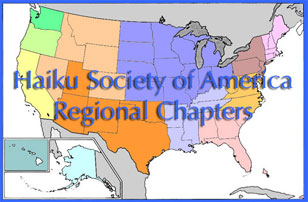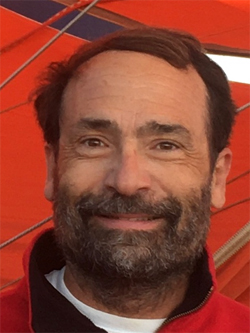Haiku Society of America Region
~ ~ ~
California Region
The California region of the Haiku Society of America has one of the richest histories for haiku poetry in all of the United States.
Many Japanese American poets wrote haiku in California early in the 1900s, and continued to write them while incarcerated in relocation camps during World War II, as documented in Violet de Cristoforo’s book May Sky: There Is Always Tomorrow.
Haiku also played an important part in the San Francisco poetry renaissance in the 1950s, influenced by and influencing many Beat poets, especially Gary Snyder, Jack Kerouac, and Allen Ginsberg.
In the 1960s, Helen Stiles Chenoweth led the Los Altos Writers Roundtable, a haiku group in the San Francisco area that in 1966 published a bestselling anthology titled Borrowed Water—one of the earliest anthologies of English-language haiku, if not the first.
Later, Los Angeles was the original home of Modern Haiku, the oldest haiku journal still being published in North America today, founded in 1969 by Kay Titus Mormino.
Early English-language haiku activity also included the Yuki Teikei Haiku Society, founded in 1975 by Kiyoshi and Kiyoko Tokutomi, which continues to thrive with its journal Geppo, monthly meetings, an annual contest and anthology, and its much-loved haiku retreat at the Asilomar Conference Center near Monterey.
The Leanfrog group was also active in the San Francisco area in the late 70s and early 80s, led by Louis Cuneo, who also published Leanfrog from 1979 to 1982, as well as a number of haiku-related books from his press.
In 1987, San Francisco was host to the East-West Haiku Conference at Hotel Nikko in San Francisco, sponsored by Japan Air Lines, an event that attracted Kazuo Sato, the international director of Tokyo’s Museum of Haiku Literature, and Makoto Ueda, the widely respected haiku translator from Stanford University (later chair of the Asian Studies department), among others. This event galvanized many haiku poets in the area to again meet informally.
Later, in 1989, came the formation of the Haiku Poets of Northern California by Garry Gay and Jerry Kilbride, another landmark event for California haiku up to that point. HPNC has been one of the most prominent local groups in the country, making a national mark with its journal Woodnotes, and later Mariposa, and its annual Two Autumns readings, which started in 1990 (the longest continuous haiku reading series in the country). HPNC is also known for its annual contests, Garry Gay’s creation of the rengay form, many group anthologies, and more.
In 1997, Jerry Ball started the Southern California Haiku Study Group, and in 2002 its members created and hosted the first Haiku Pacific Rim Conference in Long Beach. In 1999, Jerry Kilbride started the Central Valley Haiku Club, with its strong support of haibun (through an annual contest). Both groups have regular meetings and publications, and have hosted national quarterly meetings of the Haiku Society of America. And in 2010, a new group, Haiku San Diego, started in the southernmost part of the state, cofounded by Billie Dee, Naia, Eric Houck Jr., Megan Webster, and Seretta Martin.
Northern California is also home to Jane Reichhold’s AHA Books, and the AHA Poetry online site. Jane published the journal Mirrors for many years, and currently publishes Lynx with her husband Werner Reichhold. In 1989, Michael Dylan Welch started his press, Press Here, which for many years, along with AHA Books, was one of the country’s most prominent small publishers for haiku poetry, winning many Merit Book Awards from the HSA. He later started Tundra: The Journal of the Short Poem in California. Since 2000, D. F. Tweney has also been publishing haiku, mostly every day, in his online journal Tinywords. More recently, too, Carolyn Hall has taken over the journal Acorn from A. C. Missias and moved it from Pennsylvania to California.
In 1991, the Haiku North America conference had its start at Las Positas College in the Bay Area. The conference is held every two years at various locations around the continent, operated as a nonprofit California corporation directed by Michael Dylan Welch, Garry Gay, and Paul Miller. It is the largest and oldest ongoing haiku conference outside Japan. And in 1996, the American Haiku Archives was founded at the California State Library in Sacramento. This archive, which includes the official Haiku Society of America archives, is believed to be the world’s largest public collection of haiku materials outside Japan.
While each of California’s active haiku groups is independent of the Haiku Society of America, their membership rosters overlap extensively, and together they contribute to the vibrancy of haiku in California. The HSA’s California region as a whole does not usually have its own meetings, but you are encouraged to contact the California regional coordinator or any of the independent organizations for more information about their activities.
—Michael Dylan Welch
Regional Links
Acorn
http://www.acornhaiku.com/AHA Poetry
http://www.AHApoetry.comAmerican Haiku Archives
http://www.americanhaikuarchives.org/Central Valley Haiku Club
http://www.valleyhaiku.orgHaiku Poets of Northern California
http://www.hpnc.orgHaiku San Diego
http://haikusandiego.blogspot.com/Southern California Haiku Study Group
http://www.socalhaiku.orgViolet Kazue de Cristoforo
http://en.wikipedia.org/wiki/Violet_Kazue_de_CristoforoYuki Teikei Haiku Society
http://www.youngleaves.org~ ~ ~

